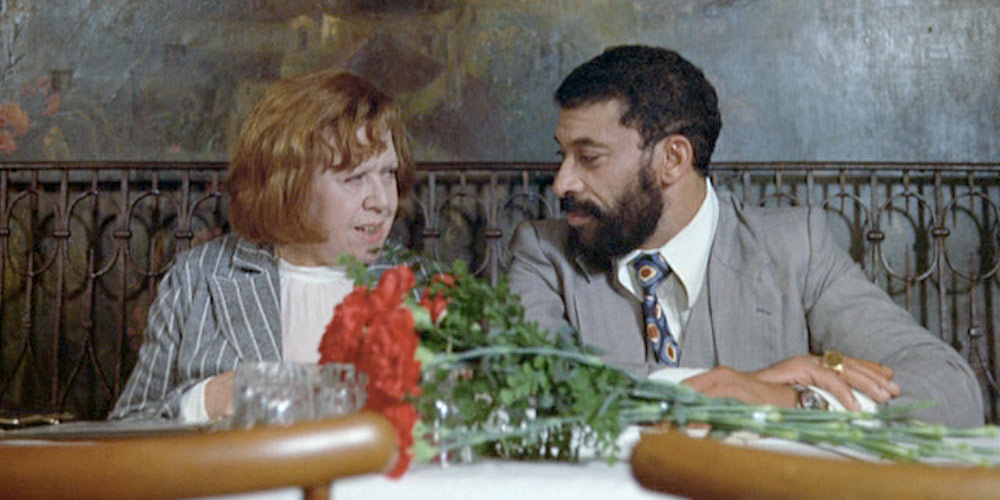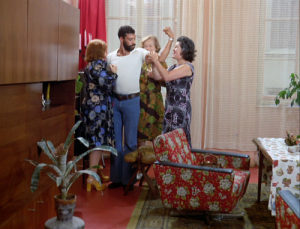
Emmi Kurowski (Brigitte Mira), a widow in her sixties, walks into a bar to take shelter from the rain. She is met with hostile stares by a mixed group of Moroccan immigrants and Germans. As a joke, one of his friends challenges Ali (El Hedi ben Salem m’Barek Mohammed Mustafa), a young strapping Berber man, to ask her for a dance. He agrees, and thus begins a romance across the taboo lines of race and age.
Ali: Fear Eats the Soul (1974) chronicles Emmi and Ali’s tender relationship that they nurture amidst the racial hatred and hostility of an intolerant society. Ali, for one, is accustomed to the prejudice – “Arabs not human in Germany. Different earlier. But since catastrophe in Munich, not good.”[1] In fact, Ali is not even his real name; he is so called because his name is too long and unfamiliar to others. Ali pithily sums up his employment experiences as “German master, Arab dog.”
Emmi lies to her colleagues that a foreigner made a pass at her in a train to gauge what their reaction to Ali would be. They chime in with every possible stereotype – “They stop at nothing”, “filthy pigs” – all of which Ali is burdened with at various points in the film.
If not as a sexual beast, the migrant is often characterised as a ‘noble savage’ in artworks produced in the Global North, his humanity teetering between these extremes. Both tropes are abundant, whether it be the infantilised Black characters in the 19th-century novel Uncle Tom’s Cabin, or, more recently, in films such as Indiana Jones and the Temple of Doom or Dances with the Wolves. This stereotyping thrives even today – in the 2016 New Year’s Eve sexual assaults in Germany, the race and ethnic origin of the assailants dominated the conversation rather than the sexual violence itself.
Ali and Emmi get married within a few days of their first meeting and soon she is met with outright hostility – her neighbours, her children and even her grocer shun her. At a café where the waiters, instead of serving them, just stare, she breaks down and she and Ali decide to go on a long holiday. On their return, her relations change their attitude – not because of some sudden enlightenment, but for purely practical considerations. Her neighbours need her cellar space, her son Bruno wants her to babysit his child and the grocer wants to regain his regular customer.
Just as suddenly, Emmi starts taking Ali for granted – she refuses to make couscous for him, saying that he should “get used to the way things are done in Germany”. (Later, a distraught Ali seeks comfort in a younger barmaid, who uncomplainingly makes couscous for him.) Now, when Emmi’s friends come over, instead of calling Ali dirty and disgusting as they earlier did, they remark on how clean and handsome he is. When they admire his musculature, she invites them to feel his biceps, as if he were some exotic pet.
In an essay, (Professor) Anca Parvulescu says that the film drives home “a message about the centrality of gender and sexuality to any analysis of labor and migration” and deems this particular scene “pivotal”. She explains, “Although Ali is very masculine … the scene effectively feminises him”. It is only by feminising him – reducing him to a sexual object to be admired – that Emmi’s friends can sublimate their fears of the migrant as a sexual beast. While their appreciation for his beauty makes him more acceptable to them, he is again stripped of his humanity. As if to reinforce this feminisation, Ali is shot nude on multiple occasions, with the camera lingering over his exposed body, but all the other characters are shown clothed throughout.
Interestingly, Rainer Werner Fassbinder, the director of the film and one of the luminaries of the German New Wave, was in a relationship with Salem. This, along with Fassbinder’s own history was probably responsible for his sympathetic treatment of Ali’s character. Salem and Fassbinder met at a café (some sources say it was a gay sauna) in 1972 and the latter soon became a part of his creative coterie as well his partner. He acted in about a dozen of Fassbinder’s films. However, their association turned out bleaker than the one Fassbinder envisaged for Ali and Emmi in his film. Drug- and alcohol-induced bouts of rage took a toll on their relationship. In a fit of jealousy, Salem went on a stabbing spree, for which he was eventually arrested and incarcerated in France. He committed suicide in prison in 1982.
Back to the film. Towards the end, just before the climax, Ali confesses to Emmi that he has not been faithful to her. Emmi, who is now repentant about her past behaviour tells Ali that it is not important. That all that matters is that “When we’re together, we must be nice to one another”. With this statement, it seems, Emmi hopes to wash away their past rancour and start afresh. But as we find out later, things are not so simple for Ali – regardless of Emmi’s acceptance of him and wishing away of racism, his identity as an immigrant and outsider in German society will always haunt him.
[1] Refers to the killing of 11 Israeli athletes by a Palestinian terrorist group at the 1972 Munich Olympic Games

